
Notice

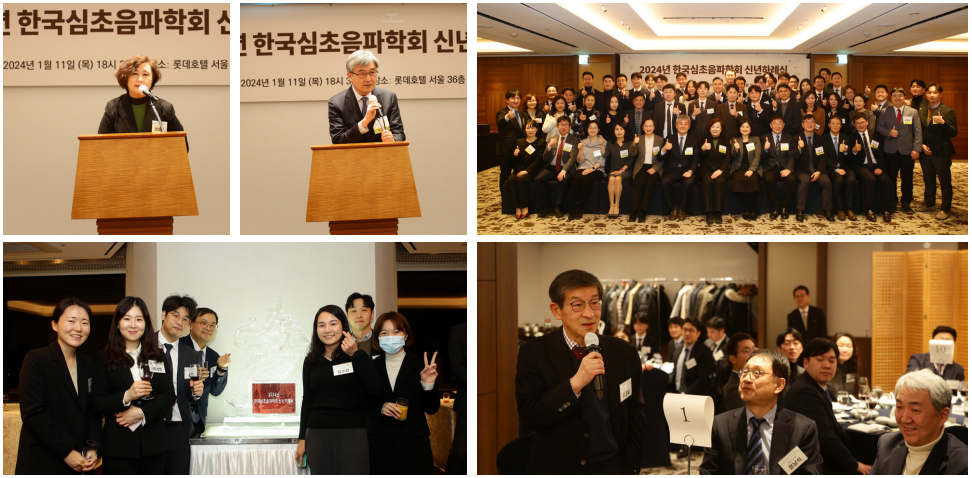 On January 11, 2024, the Korean Society of Echocardiography held its New Year’s Ceremony at Lotte Hotel Seoul. I had always admired this annual event as I embarked on my journey in echocardiography, and I was thrilled to finally have the chance to attend it in person. The opportunity to witness the vision and passion of the professors leading our society and to participate alongside them filled me with excitement and anticipation. The weather was surprisingly mild, and even the traffic seemed to cooperate, allowing me to arrive at the venue comfortably.
The neatly arranged tables at the event hall provided a warm and welcoming atmosphere, and I was delighted to share a seat with professors of a similar generation. As we exchanged greetings, the official ceremony commenced. The event began under the skilled moderation of Professor Lee Sang-cheol, our general secretary. The welcoming speeches from the newly inaugurated President, Professor Jung Jo-won, and the Chairman, Professor Jung Hae-ok, conveyed their deep affection for the society to which they have dedicated so many years. The introductions of the various executive members further highlighted the shared enthusiasm and commitment for the year ahead.
A particularly meaningful moment for me was receiving a copy of the 30-year history of the Korean Society of Echocardiography, meticulously prepared for this milestone. Through this book, I was able to glimpse the immense effort and dedication of the senior members who have contributed to the society’s growth and continuous progress over the decades. It was an invaluable opportunity to reflect on the professors’ unwavering passion and heartfelt love for the society over the past 30 years. I left the ceremony feeling inspired and determined to contribute to a productive and thriving 2024. This year, I am committed to running diligently to help the Korean Society of Echocardiography reach new heights and find joy and fulfillment within it. Thank you.
On January 11, 2024, the Korean Society of Echocardiography held its New Year’s Ceremony at Lotte Hotel Seoul. I had always admired this annual event as I embarked on my journey in echocardiography, and I was thrilled to finally have the chance to attend it in person. The opportunity to witness the vision and passion of the professors leading our society and to participate alongside them filled me with excitement and anticipation. The weather was surprisingly mild, and even the traffic seemed to cooperate, allowing me to arrive at the venue comfortably.
The neatly arranged tables at the event hall provided a warm and welcoming atmosphere, and I was delighted to share a seat with professors of a similar generation. As we exchanged greetings, the official ceremony commenced. The event began under the skilled moderation of Professor Lee Sang-cheol, our general secretary. The welcoming speeches from the newly inaugurated President, Professor Jung Jo-won, and the Chairman, Professor Jung Hae-ok, conveyed their deep affection for the society to which they have dedicated so many years. The introductions of the various executive members further highlighted the shared enthusiasm and commitment for the year ahead.
A particularly meaningful moment for me was receiving a copy of the 30-year history of the Korean Society of Echocardiography, meticulously prepared for this milestone. Through this book, I was able to glimpse the immense effort and dedication of the senior members who have contributed to the society’s growth and continuous progress over the decades. It was an invaluable opportunity to reflect on the professors’ unwavering passion and heartfelt love for the society over the past 30 years. I left the ceremony feeling inspired and determined to contribute to a productive and thriving 2024. This year, I am committed to running diligently to help the Korean Society of Echocardiography reach new heights and find joy and fulfillment within it. Thank you.
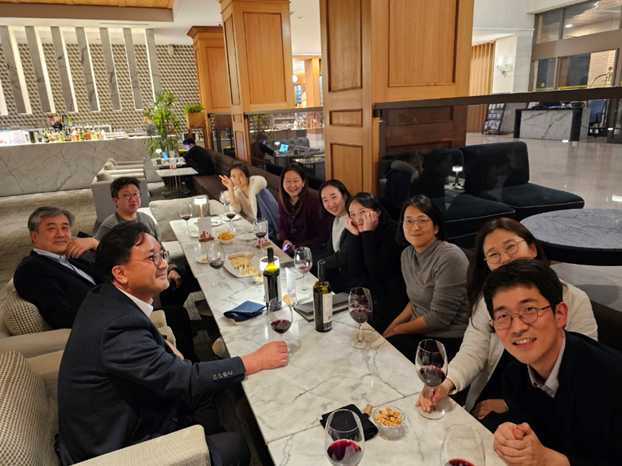 The certification exam began with the written test at 9:00 AM, followed by the practical test in the afternoon. Despite the chilly morning weather, the test center was heated by the enthusiasm of the candidates. A total of 119 individuals took the exam, with a 98.9% pass rate for the written test and a 78.9% pass rate for the practical test. During the review of the written test questions, there were concerns among the Education Committee members about the difficulty of the questions and whether the pass rate might be too low. However, the results proved these worries unfounded.
The certification exam began with the written test at 9:00 AM, followed by the practical test in the afternoon. Despite the chilly morning weather, the test center was heated by the enthusiasm of the candidates. A total of 119 individuals took the exam, with a 98.9% pass rate for the written test and a 78.9% pass rate for the practical test. During the review of the written test questions, there were concerns among the Education Committee members about the difficulty of the questions and whether the pass rate might be too low. However, the results proved these worries unfounded.
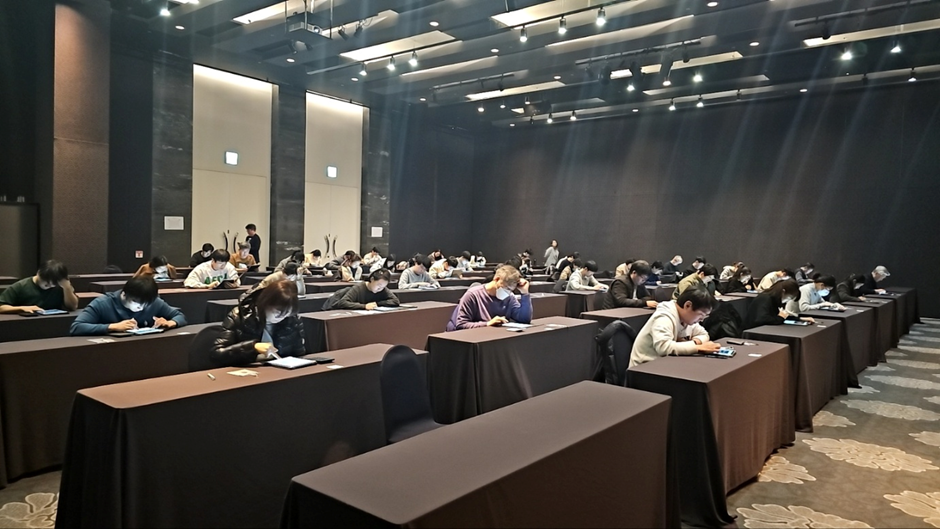 An overview of written examination venue
An overview of written examination venue
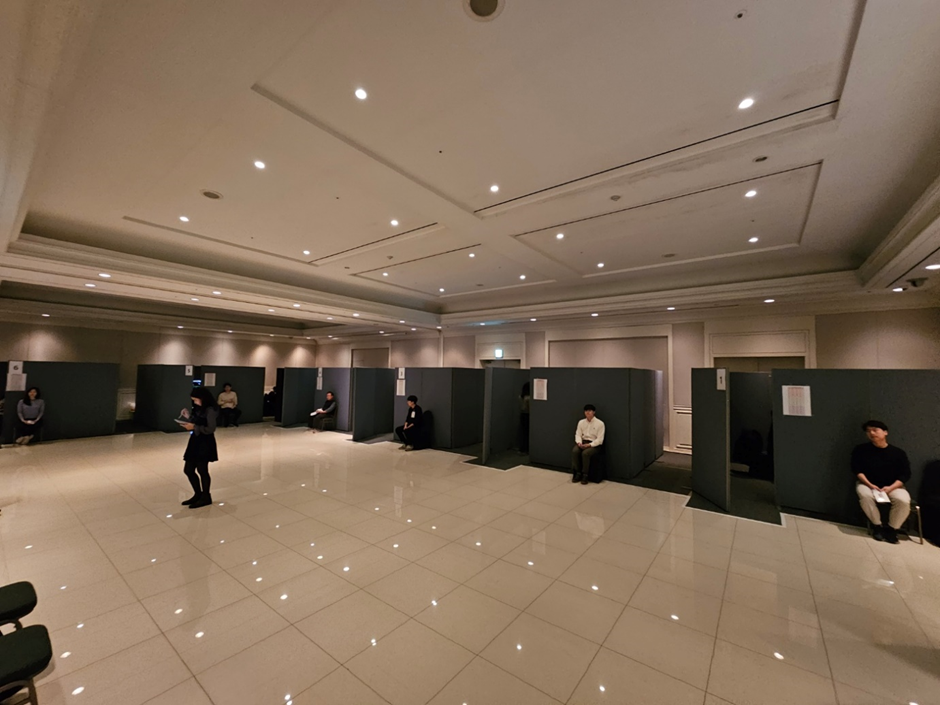 An overview of practical examination venue
An overview of practical examination venue
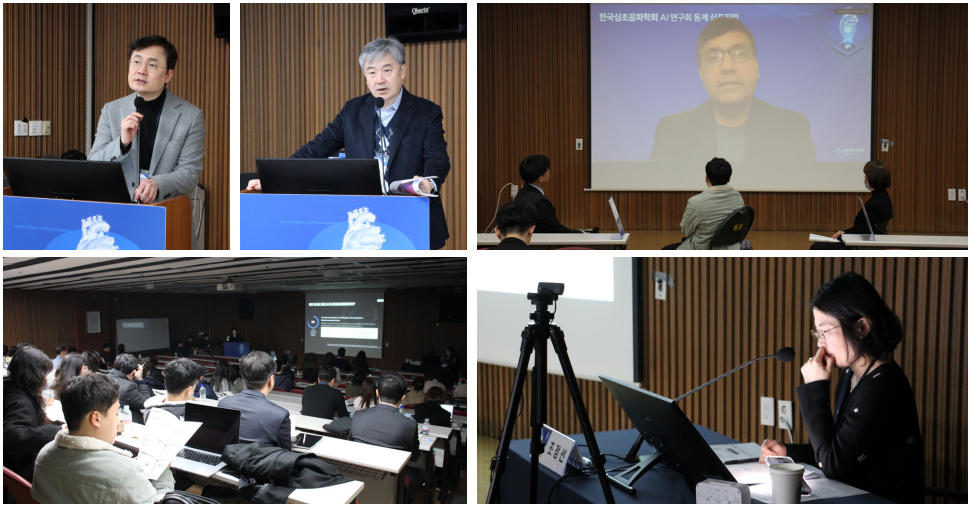 The AI Research Symposium of the Korean Society of Echocardiography commenced with an opening remark by Chairman Jung Hae-ok, reflecting the society’s support and enthusiasm for the AI research group. Similar to last year, Session 1 introduced the latest AI-based applications of GE, Siemens, and Canon, offering a glimpse into the future of commercial echocardiography. The highlight of the symposium featured a presentation by Professor Partho Sengupta (Robert Wood Johnson Medical School), renowned for his publications in JACC: Imaging on echocardiographic data analysis using topology and deep learning. Additionally, Professor Rohan Khera (Yale School of Medicine), a promising young researcher, introduced his recent study on utilizing AI algorithms to enable automatic detection of aortic stenosis through 2D imaging, bypassing the need for Doppler measurements, which makes portable echocardiography accessible even for non-cardiologists. The subsequent panel discussion was a vibrant exchange, with emerging researchers asking numerous thought-provoking questions about the future of AI in echocardiography in Korea. The engaging dialogue helped deepen the audience's understanding of this rapidly evolving field.
The AI Research Symposium of the Korean Society of Echocardiography commenced with an opening remark by Chairman Jung Hae-ok, reflecting the society’s support and enthusiasm for the AI research group. Similar to last year, Session 1 introduced the latest AI-based applications of GE, Siemens, and Canon, offering a glimpse into the future of commercial echocardiography. The highlight of the symposium featured a presentation by Professor Partho Sengupta (Robert Wood Johnson Medical School), renowned for his publications in JACC: Imaging on echocardiographic data analysis using topology and deep learning. Additionally, Professor Rohan Khera (Yale School of Medicine), a promising young researcher, introduced his recent study on utilizing AI algorithms to enable automatic detection of aortic stenosis through 2D imaging, bypassing the need for Doppler measurements, which makes portable echocardiography accessible even for non-cardiologists. The subsequent panel discussion was a vibrant exchange, with emerging researchers asking numerous thought-provoking questions about the future of AI in echocardiography in Korea. The engaging dialogue helped deepen the audience's understanding of this rapidly evolving field.
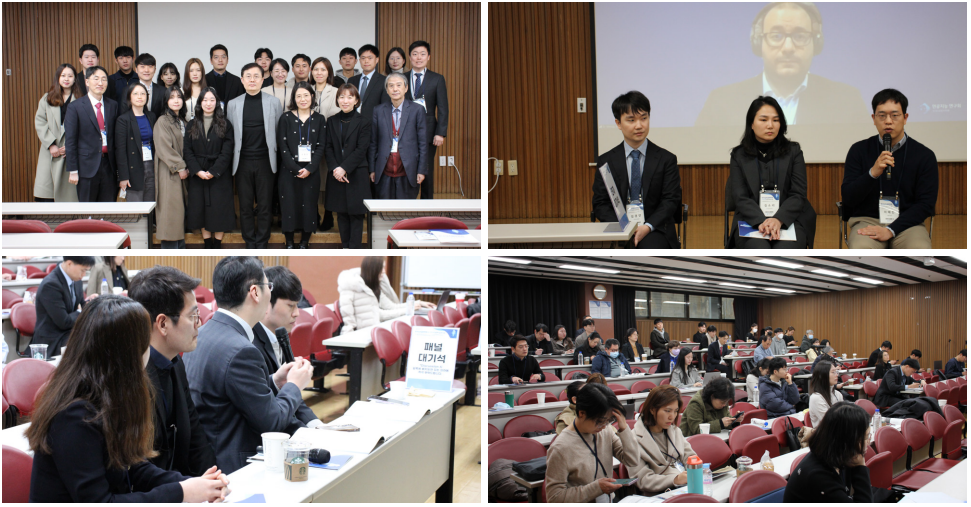 The final session featured presentations on ongoing research projects. Dr. Lee Gi-na (Yonsei University) discussed the echocardiographic differentiation of myocardial hypertrophy that introduces the term 'Ultromics' in the era of Omics. Dr. Park Ji-seok (Seoul National University Bundang Hospital) shared his work on AI-automated diagnostics of left ventricular diastolic function, which likely inspired the audience. Professor Yang Dong-hyun (Asan Medical Center), a pioneer in AI research utilizing Korean echocardiographic imaging data, addressed challenges and current issues in myocardial segmentation. Closing the symposium, Dr. Olivier Bernard (University of Lyon) delivered a compelling presentation on how AI-driven image analysis could extend beyond diagnostics to patient stratification, contributing to an integrated therapeutic approach. The 2024 AI Research Winter Symposium was another exceptional program that raised expectations for future meetings. Special thanks go to President Jang Hyuk-jae and Professor Heo Ran for their dedication in organizing this insightful event.
The final session featured presentations on ongoing research projects. Dr. Lee Gi-na (Yonsei University) discussed the echocardiographic differentiation of myocardial hypertrophy that introduces the term 'Ultromics' in the era of Omics. Dr. Park Ji-seok (Seoul National University Bundang Hospital) shared his work on AI-automated diagnostics of left ventricular diastolic function, which likely inspired the audience. Professor Yang Dong-hyun (Asan Medical Center), a pioneer in AI research utilizing Korean echocardiographic imaging data, addressed challenges and current issues in myocardial segmentation. Closing the symposium, Dr. Olivier Bernard (University of Lyon) delivered a compelling presentation on how AI-driven image analysis could extend beyond diagnostics to patient stratification, contributing to an integrated therapeutic approach. The 2024 AI Research Winter Symposium was another exceptional program that raised expectations for future meetings. Special thanks go to President Jang Hyuk-jae and Professor Heo Ran for their dedication in organizing this insightful event.
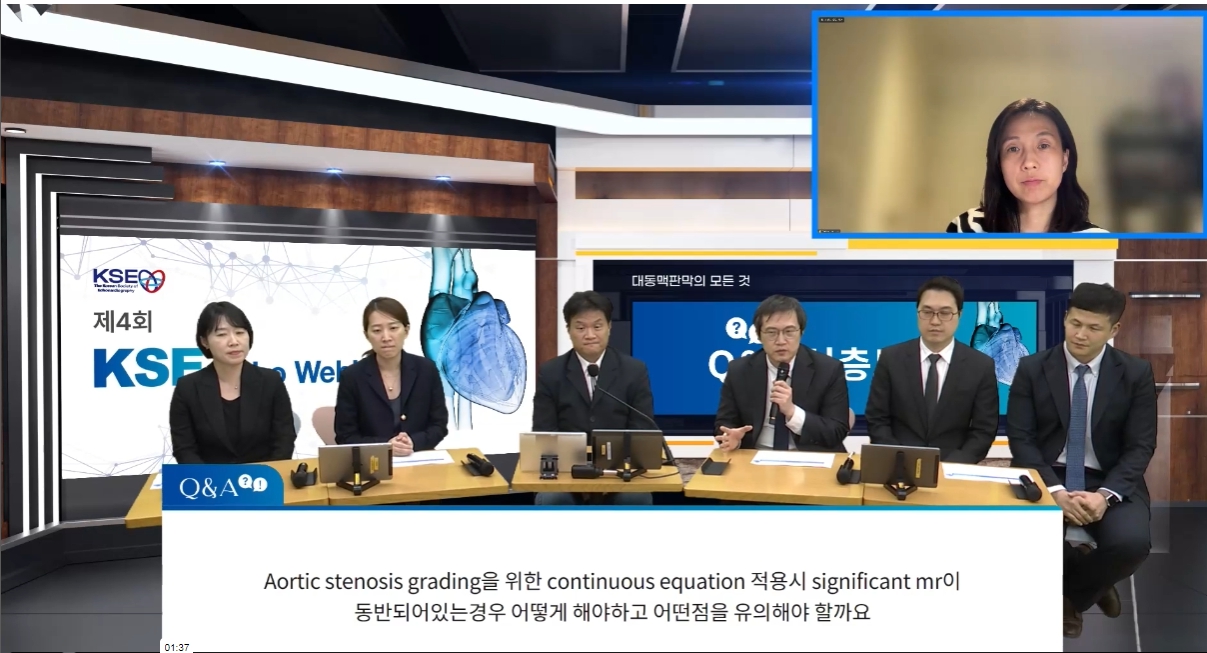 Professor Jeong Woo-baek played a pivotal role in the event. Professors Shim Ji-young and Kim Eun-kyung participated as panelists. Professor Shim attended in person and Professor Kim joined remotely from the United States. A new role of "Chat Facilitator" was introduced, and Professors Joh Ik-sung and Kim In-chul managed and responded to real-time audience questions. Despite being held on a weekday evening, the webinar saw over 2,000 pre-registrations, and more than 1,000 attendees participated live. This turnout underscored the widespread interest in ultrasound based examination of the aortic valve. Particularly, the quality of real-time questions submitted by attendees impressed the professors. What set this webinar apart was its focus on case-based discussions rather than merely conveying textbook or literature-based knowledge. Amidst the many challenges of recent times, I could feel the passion and dedication of many colleagues toward gaining knowledge for patient care, even in the midst of busy and exhausting days. Although the harsh winter has passed and spring is now in full bloom, I believe many of our minds and hearts still feel cold and weary. Amidst the many challenges of recent times, I could feel the passion and dedication of many colleagues toward gaining knowledge for patient care, even in the midst of busy and exhausting days. Although the harsh winter has passed and spring is now in full bloom, I believe many of our minds and hearts still feel cold and weary. Let us not forget to extend our encouragement and support to our fellow colleagues and juniors, so that while we may have lost much, we do not lose the spirit of spring as well.
Professor Jeong Woo-baek played a pivotal role in the event. Professors Shim Ji-young and Kim Eun-kyung participated as panelists. Professor Shim attended in person and Professor Kim joined remotely from the United States. A new role of "Chat Facilitator" was introduced, and Professors Joh Ik-sung and Kim In-chul managed and responded to real-time audience questions. Despite being held on a weekday evening, the webinar saw over 2,000 pre-registrations, and more than 1,000 attendees participated live. This turnout underscored the widespread interest in ultrasound based examination of the aortic valve. Particularly, the quality of real-time questions submitted by attendees impressed the professors. What set this webinar apart was its focus on case-based discussions rather than merely conveying textbook or literature-based knowledge. Amidst the many challenges of recent times, I could feel the passion and dedication of many colleagues toward gaining knowledge for patient care, even in the midst of busy and exhausting days. Although the harsh winter has passed and spring is now in full bloom, I believe many of our minds and hearts still feel cold and weary. Amidst the many challenges of recent times, I could feel the passion and dedication of many colleagues toward gaining knowledge for patient care, even in the midst of busy and exhausting days. Although the harsh winter has passed and spring is now in full bloom, I believe many of our minds and hearts still feel cold and weary. Let us not forget to extend our encouragement and support to our fellow colleagues and juniors, so that while we may have lost much, we do not lose the spirit of spring as well.
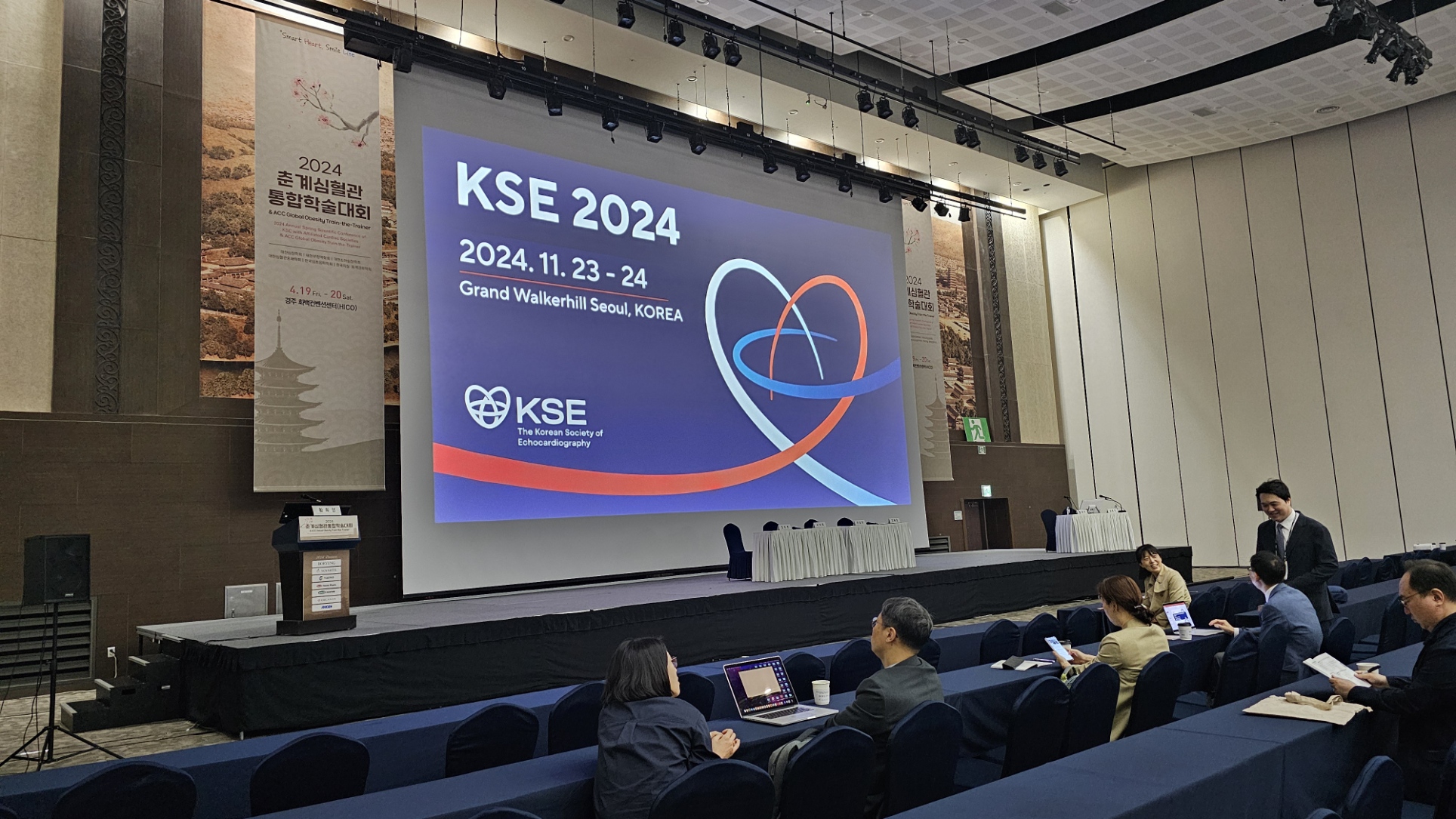 The 2024 Spring Cardiovascular Integrated Conference was held over two days, April 19–20, at HICO in Gyeongju. Although the weather on the way to the conference was bright and full of spring, the somber societal atmosphere tempered the joy of attending. However, upon arriving at the venue and witnessing the passionate participation of so many colleagues, I realized that we are true scientists, diligently studying even in the face of a grim reality.
The Korean Society of Echocardiography (KSE) hosted four sessions over the two mornings in the main room on the third floor. On April 19, the first session, titled "KSE 1: Updated Guidelines—What’s New and How to Implement in Practice", was chaired by Professors Song Jong-min (Ulsan University College of Medicine) and Joh Koo-young (Seoul National University College of Medicine). Based on the recently published ESC and AHA guidelines, Prof. Hwang Hee-jeong (Kyung Hee University College of Medicine) lectured on infective endocarditis, Prof. Lee Seung-pyo (Seoul National University College of Medicine) covered hypertrophic cardiomyopathy, Prof. Yoon Hyun-joo (Chonnam National University College of Medicine) discussed cardio-oncology, and Prof. Choi Ui-young (Yonsei University College of Medicine) presented on cardiovascular assessment before non-cardiac surgery. These lectures effectively summarized recent changes in the guidelines and key recommendations for clinical practice.
The second session featured lectures from trusted experts: Prof. Ha Jong-won (Yonsei University College of Medicine) on diastolic function, Prof. Song Jae-gwan (Ulsan University College of Medicine) on mitral regurgitation, and Prof. Lee Sang-cheol (Sungkyunkwan University College of Medicine) on thick myocardium. Each lecture was based on specific cases, providing in-depth discussions on key points to consider when interpreting findings and clinical discoveries that influence treatment decisions. What stood out was the participation of junior professors as panelists, creating an interactive platform to address practical questions and foster meaningful discussions. Personally, it was a highly valuable learning opportunity.
On the first day, right after lunch, there was a case presentation session on Echo & Imaging. Topics included IVUS, stiff LA syndrome, leaflet thrombosis after TAVI, cancer-associated nonbacterial thrombotic endocarditis, and recurrent pericardial effusion. Among the fascinating cases, Dr. Kim Chang-hoon from Sungkyunkwan University College of Medicine, who thoroughly presented the process of diagnosing and treating leaflet thrombosis after TAVI, was awarded Best Case.
The 2024 Spring Cardiovascular Integrated Conference was held over two days, April 19–20, at HICO in Gyeongju. Although the weather on the way to the conference was bright and full of spring, the somber societal atmosphere tempered the joy of attending. However, upon arriving at the venue and witnessing the passionate participation of so many colleagues, I realized that we are true scientists, diligently studying even in the face of a grim reality.
The Korean Society of Echocardiography (KSE) hosted four sessions over the two mornings in the main room on the third floor. On April 19, the first session, titled "KSE 1: Updated Guidelines—What’s New and How to Implement in Practice", was chaired by Professors Song Jong-min (Ulsan University College of Medicine) and Joh Koo-young (Seoul National University College of Medicine). Based on the recently published ESC and AHA guidelines, Prof. Hwang Hee-jeong (Kyung Hee University College of Medicine) lectured on infective endocarditis, Prof. Lee Seung-pyo (Seoul National University College of Medicine) covered hypertrophic cardiomyopathy, Prof. Yoon Hyun-joo (Chonnam National University College of Medicine) discussed cardio-oncology, and Prof. Choi Ui-young (Yonsei University College of Medicine) presented on cardiovascular assessment before non-cardiac surgery. These lectures effectively summarized recent changes in the guidelines and key recommendations for clinical practice.
The second session featured lectures from trusted experts: Prof. Ha Jong-won (Yonsei University College of Medicine) on diastolic function, Prof. Song Jae-gwan (Ulsan University College of Medicine) on mitral regurgitation, and Prof. Lee Sang-cheol (Sungkyunkwan University College of Medicine) on thick myocardium. Each lecture was based on specific cases, providing in-depth discussions on key points to consider when interpreting findings and clinical discoveries that influence treatment decisions. What stood out was the participation of junior professors as panelists, creating an interactive platform to address practical questions and foster meaningful discussions. Personally, it was a highly valuable learning opportunity.
On the first day, right after lunch, there was a case presentation session on Echo & Imaging. Topics included IVUS, stiff LA syndrome, leaflet thrombosis after TAVI, cancer-associated nonbacterial thrombotic endocarditis, and recurrent pericardial effusion. Among the fascinating cases, Dr. Kim Chang-hoon from Sungkyunkwan University College of Medicine, who thoroughly presented the process of diagnosing and treating leaflet thrombosis after TAVI, was awarded Best Case.
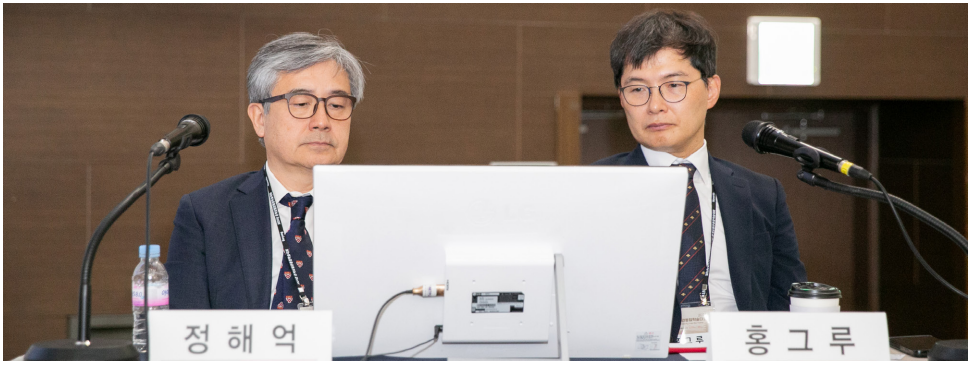 The third session took place on the morning of the second day, focusing on Atrial Functional Mitral and Tricuspid Regurgitation. Prof. Joh Ik-sung from Yonsei University College of Medicine, Prof. Judy Hung from Massachusetts, Prof. Kim Dae-hee from Ulsan University College of Medicine, and Prof. Shin Sung-hee from Inha University College of Medicine delivered excellent lectures on the pathophysiology of atrial MR and TR, atrial dysfunction, and their respective treatments. The session facilitated an in-depth discussion on atrial functional MR and TR. Notably, prominent arrhythmia professors attended as the audience the session, reminding me that atrial MR and TR remain a hot topic in cardiology.
The final session addressed Aortic Stenosis (AS), focusing on the interpretation of diagnostic tests and approaches for ambiguous or inconclusive diagnoses. Prof. Park Sung-ji from Sungkyunkwan University College of Medicine delivered a clear lecture on critical pitfalls and tips for obtaining imaging. Prof. Joh Dong-hyuk from Korea University College of Medicine highlighted the role of DSE in AS, cautionary points in its interpretation, and additional parameters to consider when limitations arise. Prof. Shim Ji-young from Yonsei University College of Medicine provided an easy-to-understand and concise lecture on the role of multi-modality imaging in diagnosing and evaluating AS. Finally, Prof. Sun Byung-joo from Ulsan University College of medicine gave a clinically practical lecture on AS evaluation in the presence of other valvular heart diseases. This session offered an excellent opportunity to consolidate my understanding of AS diagnosis and reminded me once again that learning is truly endless.
This year's program was of high quality and undoubtedly provided great satisfaction to all attendees, including myself, during these challenging times. I hope that next year, with improvements in the healthcare environment, we can attend the conference with greater peace of mind.
The third session took place on the morning of the second day, focusing on Atrial Functional Mitral and Tricuspid Regurgitation. Prof. Joh Ik-sung from Yonsei University College of Medicine, Prof. Judy Hung from Massachusetts, Prof. Kim Dae-hee from Ulsan University College of Medicine, and Prof. Shin Sung-hee from Inha University College of Medicine delivered excellent lectures on the pathophysiology of atrial MR and TR, atrial dysfunction, and their respective treatments. The session facilitated an in-depth discussion on atrial functional MR and TR. Notably, prominent arrhythmia professors attended as the audience the session, reminding me that atrial MR and TR remain a hot topic in cardiology.
The final session addressed Aortic Stenosis (AS), focusing on the interpretation of diagnostic tests and approaches for ambiguous or inconclusive diagnoses. Prof. Park Sung-ji from Sungkyunkwan University College of Medicine delivered a clear lecture on critical pitfalls and tips for obtaining imaging. Prof. Joh Dong-hyuk from Korea University College of Medicine highlighted the role of DSE in AS, cautionary points in its interpretation, and additional parameters to consider when limitations arise. Prof. Shim Ji-young from Yonsei University College of Medicine provided an easy-to-understand and concise lecture on the role of multi-modality imaging in diagnosing and evaluating AS. Finally, Prof. Sun Byung-joo from Ulsan University College of medicine gave a clinically practical lecture on AS evaluation in the presence of other valvular heart diseases. This session offered an excellent opportunity to consolidate my understanding of AS diagnosis and reminded me once again that learning is truly endless.
This year's program was of high quality and undoubtedly provided great satisfaction to all attendees, including myself, during these challenging times. I hope that next year, with improvements in the healthcare environment, we can attend the conference with greater peace of mind.